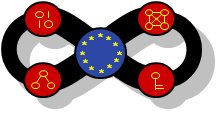Institut national de Recherche en Informatique et en Automatique

INRIA, the national institute for research in computer science and control, operating under the dual authority of the Ministry of Research and the Ministry of Industry, is dedicated to fundamental and applied research in information and communication science and technology (ICST). The Institute also plays a major role in technology transfer by fostering training through research, diffusion of scientific and technical information, development, as well as providing expert advice and participating in international programs. By playing a leading role in the scientific community in the field and being in close contact with industry, INRIA is a major participant in the development of ICST in France. It is composed of 8 research units and has a workforce of 3,500, 2,700 of whom are scientists from INRIA's partner organizations such as CNRS (the French National Centre for Scientific Research), universities and leading engineering schools. They work in 120 joint research projects. Many INRIA researchers are also professors whose approximately 950 doctoral students work on theses as part of INRIA research projects.
Research groups involved in SecureChange are CASSIS from INRIA Nancy Grand-Est and POPS from INRIA Lille Nord Europe.
The POPS research group investigates solutions to enhance programmability, adaptability and reachability of small objects designated by POPS (Portable Objects Proved to be Safe. POPS has a long term experience of design of secured systems and applications for smart Cards.
Key Personnel:
Samuel Hym joined POPS in February 2008 after a PhD Thesis form Paris 7 on how to type some process calculus in order to control the mobility code and a Post-doctoral fellowship in LIP (Lyon) on how to model and reason about programs using on dynamic modularity.
Isabelle Simplot-Ryl received her PhD in Lille and joined the Univ. of Lille after a post-doctoral fellowship in Oslo Univ. Her prime research interest is on Software specification and verification, safety and security in embedded and mobile systems.
The CASSIS research group is the design and the development of tools for checking the safety of systems with an infinite number of states. Our analysis of systems is based on a symbolic representation of the sets of states as formal languages or logical formulas. Safety is obtained by automated proofs, symbolic exploration of models, or tests generation. An originality of the project lies in its focus on the infinite systems, parameterized or of large size, where each technique taken separately shows its limits. As examples of such systems we can mention protocols operating on topologies of arbitrary size (ring networks), systems handling data structures with unspecified size (sets), or whose control is infinite (automata communicating by unlimited buffers).
Key Personnel:
Pr Fabrice Bouquet is Professor of Software Engineering at the University of Franche-Comté (UFC) member of INRIA Cassis project since 2002 and Header of Model-Based Testing groups. Main research interests are semantics of modelling languages for test generation and test generation strategies.
Dr Frederic Dadeau is Lecturer at UFC, member of INRIA Cassis since 2004. Research interests are test generation from requirements
Pr Jacques Juilliand is Professor of Software Engineering at UFC, Research interests are definition of system's properties and usage for test generations.
Dr Pierre-Alain Masson is lecturer at UFC. His research interests are temporal properties and usage for test generation.
Dr Christophe Ringeissen is INRIA full time researcher. Research interests are verification and proover based on SAT modulo theory.
Stéphane Debricon is research project manager at the University of Franche-Comté since 2006. Stéphane Debricon, graduated from the University of Franche-Comté in 1997, was project leader for 10 years for society OrdoSoftware, publisher of an ERP. He is currently preparing a phD on methodologies and tools for tests generation from a model in the research team Vesontio of the Laboratoire d'Informatique de l'Université de Franche-Comté and a member of the INRIA project Cassis.





